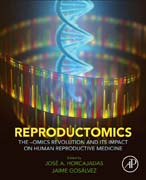
Reproductomics: The -Omics Revolution and its Impact on Human Reproductive Medicine
Horcajadas, Jose
Gosalvez, Jaime
Recent advances in genomic and omics analysis have triggered a revolution affecting nearly every field of medicine, including reproductive medicine, obstetrics, gynecology, andrology, and infertility treatment. Reproductomics: The -Omics Revolution and its Impact on Human Reproductive Medicine shows how genomics and various omics technologies are already significantly aiding fertility specialists and clinicians in counseling couples towards pregnancy success, characterizing patients, and informing embryo selection. Information derived from omics approaches and bioinformatics are coupled in order to offer an in-depth view of the human reproduction system. A diverse range of chapters from international experts demonstrate the complex relationship between genomics, epigenomics, transcriptomics, proteomics, and metabolomics and their role in human reproduction, identifying within these singular pathways specific genomic and molecular factors of translational impact. With this book Editors Jaime Gosálvez and José Horcajadas have provided researchers and clinicians with a strong foundation for a new era of personalized reproductive medicine. Provides a thorough introduction to the omics revolution and its implications for reproductive medicine, clearly illustrating the complex relationship between genomic, epigenomic, transcriptomic, proteomic, and metabolomic pathways and their role in human reproductionDemonstrates how genomics and other omics approaches are already aiding fertility specialists and clinical geneticists in counseling couples towards pregnancy success, characterizing patients, and informing embryo selectionIdentifies specific genomic and molecular factors of translational impact that may assist researchers and clinicians in better understanding omics approaches to treating infertility and analyzing patient data, providing a strong foundation for a new era of personalized reproductive medicineFeatures chapter contributions by leading international experts INDICE: INTRODUCTION 1. Human Genome Projects: the starting point 2. Classic spermiogram: still informative? GENOMICS 3. Genetics variations and human infertility 4. Preconceptional analysis of monogenic diseases 5. Genetic selection of the human embryos: from FISH to NGS, past and future 6. Non-invasive prenatal diagnosis 7. Genetic point mutations in male infertility 8. Telomere length and idiopathic infertility FUNCTIONAL GENOMICS OR TRANSCRIPTOMICS 9. The molecular signature of the endometrial receptivity: research and clinical application 10. Gene expression of cumulus cells: an indirect diagnosis of oocyte quality 11. Variations in the gene expression of the sperm: clinical use 12. Transcriptomic of the embryo and embryo viability: the inner cell mass and the trophoblast 13. Altered gene expression profiles associated with infertility 14. Prostasomes and fertility 15. Small RNAs in human sperm PROTEOMICS AND METABOLOMICS 16. Non-invasive methods of embryo selection 17. Proteomics and metabolomics studies and clinical outcomes EPIGENOMICS 18. Epigenetics in spermatogenesis 19. Epigenetics, spermatogenesis and male infertility 20. Changes in DNA methylation related with male infertility 21. Epigenomics of the embryo: in vivo and in vitro evidences 22. Artificial Spermatoza COMPUTATIONAL BIOLOGY 23. Computational approaches in Reproductomics CONCLUSIONS 24. Year 2050: The -Omics? technologies and Personalized Assisted Reproduction
- ISBN: 978-0-12-812571-7
- Editorial: Academic Press
- Encuadernacion: Rústica
- Páginas: 464
- Fecha Publicación: 01/03/2018
- Nº Volúmenes: 1
- Idioma: Inglés
